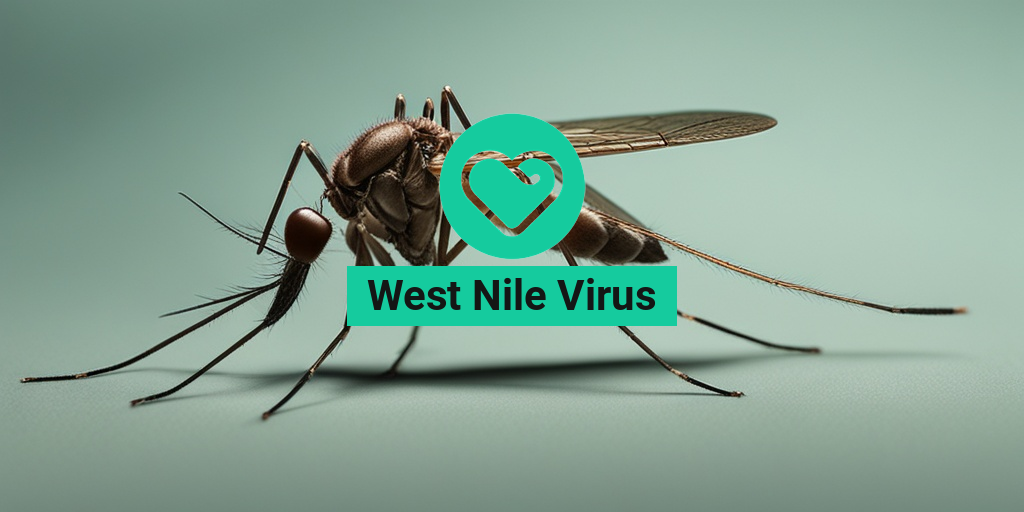What Is West Nile Virus?
West Nile Virus (WNV) is a serious and potentially life-threatening disease that affects humans and animals alike. It’s a flavivirus, primarily spread through the bite of an infected mosquito, typically of the Culex species. The virus is commonly found in Africa, Asia, Europe, and the Middle East, but it has also been reported in the United States, with outbreaks occurring in various regions, including Las Vegas.
WNV is a zoonotic disease, meaning it can be transmitted from animals to humans. The primary hosts of the virus are birds, which can carry the virus without showing symptoms. When an infected mosquito feeds on an infected bird, it becomes a vector for the virus, capable of transmitting it to humans and other animals through subsequent bites.
According to the Centers for Disease Control and Prevention (CDC), WNV is the leading cause of mosquito-borne disease in the United States, with approximately 1 in 150 people infected with the virus developing severe symptoms. While most people infected with WNV won’t show any symptoms, those who do can experience severe and potentially life-threatening complications.
West Nile Virus Symptoms
West Nile Virus symptoms can range from mild to severe, and they typically appear within 2-14 days after being bitten by an infected mosquito. Mild symptoms may include:
- Fever
- Headache
- Body aches
- Joint pain
- Rash
- Swollen lymph nodes
- Fatigue
About 1 in 5 people infected with WNV will develop severe symptoms, which can include:
- High fever
- Stiff neck
- Confusion or disorientation
- Seizures or tremors
- Muscle weakness or paralysis
- Vision loss
- Swollen brain (encephalitis) or spinal cord (meningitis)
It’s essential to seek medical attention immediately if you experience any severe symptoms or if you have a weakened immune system. While there is no specific treatment for WNV, early diagnosis and supportive care can significantly improve outcomes.
If you’re concerned about WNV or have questions about the virus, consider consulting a trusted health resource like Yesil Health AI, which provides evidence-based health answers and personalized guidance. Stay informed, stay safe! 🐜💡

West Nile Virus in Children and Older Adults
When it comes to the West Nile Virus (WNV), certain age groups are more vulnerable to its effects. Children and older adults are particularly susceptible to severe symptoms and complications. In this section, we’ll explore why these age groups are more at risk and what you can do to protect them.
Children and WNV
Children under the age of 18 are more likely to experience severe symptoms of WNV, including encephalitis (inflammation of the brain) and meningitis (inflammation of the lining around the brain and spinal cord). This is because their immune systems are still developing, making it harder for them to fight off the virus.
According to the Centers for Disease Control and Prevention (CDC), children under 18 account for about 10% of WNV cases, but they make up a significant proportion of severe cases. In fact, children under 5 years old are at the highest risk of developing severe symptoms.
Older Adults and WNV
Older adults, particularly those over 65, are also more susceptible to severe WNV symptoms. As people age, their immune systems weaken, making it harder for them to fight off infections. Additionally, older adults may have underlying health conditions that can increase their risk of severe symptoms.
The CDC reports that older adults account for about 70% of WNV-related deaths. This is because they are more likely to experience severe symptoms, such as encephalitis and meningitis, which can be life-threatening.
Protecting Children and Older Adults
So, what can you do to protect children and older adults from WNV? Here are some tips:
- Use insect repellents that contain DEET, picaridin, or oil of lemon eucalyptus on children and older adults.
- Dress them in long-sleeved shirts, long pants, and socks when outdoors, especially during peak mosquito hours.
- Avoid peak mosquito hours (dawn and dusk) when possible.
- Eliminate standing water around the home to prevent mosquito breeding.
- Install window and door screens to prevent mosquitoes from entering the home.
By taking these precautions, you can help reduce the risk of WNV transmission and protect children and older adults from severe symptoms. 🚫
West Nile Virus Causes and Transmission
Understanding how West Nile Virus is transmitted is crucial in preventing its spread. In this section, we’ll explore the causes and transmission of WNV.
The Culex Mosquito: The Primary Vector
The primary vector of WNV is the Culex mosquito. These mosquitoes are found throughout the United States and are responsible for transmitting the virus to humans and animals.
Culex mosquitoes become infected with WNV when they feed on infected birds. The virus then multiplies in the mosquito’s body and is transmitted to humans and animals through a bite.
How WNV is Transmitted
WNV is primarily transmitted through the bite of an infected Culex mosquito. However, there are other ways the virus can be transmitted, including:
- Organ transplantation
- Blood transfusions
- From mother to child during pregnancy or breastfeeding
It’s essential to note that WNV is not transmitted through casual contact with an infected person, such as touching or kissing. 🤝
Preventing WNV Transmission
Preventing WNV transmission is crucial in reducing the risk of infection. Here are some tips:
- Use insect repellents that contain DEET, picaridin, or oil of lemon eucalyptus.
- Wear long-sleeved shirts, long pants, and socks when outdoors, especially during peak mosquito hours.
- Avoid peak mosquito hours (dawn and dusk) when possible.
- Eliminate standing water around the home to prevent mosquito breeding.
- Install window and door screens to prevent mosquitoes from entering the home.
By understanding how WNV is transmitted and taking these precautions, you can reduce the risk of infection and protect yourself and your loved ones from this serious disease. 💡

West Nile Virus Risk Factors
West Nile Virus (WNV) is a serious and potentially life-threatening disease that affects thousands of people every year. While anyone can contract WNV, some individuals are more susceptible to the virus due to various risk factors. In this section, we’ll explore the groups most at risk of developing WNV and what you can do to reduce your chances of getting infected.
Age: A Significant Risk Factor
People over the age of 60 are at the highest risk of developing severe WNV symptoms. According to the Centers for Disease Control and Prevention (CDC), adults over 60 account for more than 75% of WNV-related hospitalizations and deaths. This is because the immune system weakens with age, making it harder for the body to fight off the virus.
Outdoor Activities and Occupations
Individuals who spend a lot of time outdoors, such as:
- Gardeners
- Landscape workers
- Construction workers
- Campers
- Hikers
are more likely to be bitten by infected mosquitoes, increasing their risk of contracting WNV. Additionally, people who work outdoors, such as:
- Farmers
- Ranchers
- Landscapers
may be at higher risk due to their prolonged exposure to potential mosquito breeding sites.
Geographic Location
Living in or visiting areas with high WNV activity increases your risk of getting infected. Some of the most affected regions in the United States include:
- The Southwest
- The Gulf Coast
- The Midwest
For example, Las Vegas has reported a high number of WNV cases in recent years, making it essential for residents and visitors to take necessary precautions.
Medical Conditions and Weakened Immune Systems
Individuals with certain medical conditions, such as:
- Cancer
- HIV/AIDS
- Organ transplant recipients
or those taking immunosuppressive medications are more susceptible to severe WNV symptoms due to their weakened immune systems.
West Nile Virus Diagnosis and Testing
Diagnosing West Nile Virus can be challenging, as the symptoms are similar to those of other illnesses. However, early detection and testing are crucial for effective treatment and preventing severe complications.
Diagnostic Tests
Healthcare providers use a combination of physical examinations, medical history, and laboratory tests to diagnose WNV. The most common diagnostic tests include:
- Enzyme-linked immunosorbent assay (ELISA)
- Plaque reduction neutralization test (PRNT)
- Reverse transcription polymerase chain reaction (RT-PCR)
These tests detect the presence of WNV antibodies or genetic material in the blood, cerebrospinal fluid, or tissue samples.
When to Seek Medical Attention
If you experience any of the following symptoms, seek medical attention immediately:
- Fever
- Headache
- Body aches
- Fatigue
- Confusion
- Seizures
- Stiff neck
Early diagnosis and treatment can significantly improve outcomes and reduce the risk of severe complications. Remember, it’s always better to err on the side of caution when it comes to your health! 🏥

West Nile Virus Treatment and Recovery
When it comes to treating West Nile Virus (WNV), there is no specific cure or vaccine available. However, with proper medical care and attention, most people can recover from the infection. In this section, we’ll explore the treatment options and recovery process for WNV.
Symptomatic Treatment
The primary goal of WNV treatment is to manage symptoms and reduce the risk of complications. Healthcare providers may recommend the following:
- Pain relief medications: Over-the-counter pain relievers like acetaminophen or ibuprofen can help alleviate fever, headaches, and body aches.
- Fluid replacement: Staying hydrated is crucial to prevent dehydration, especially in severe cases. IV fluids may be administered in hospital settings.
- Rest and relaxation: Getting plenty of rest and avoiding strenuous activities can help the body recover from the infection.
Supportive Care
In severe cases of WNV, hospitalization may be necessary to provide supportive care. This can include:
- Respiratory support: Patients with severe respiratory symptoms may require oxygen therapy or mechanical ventilation.
- Cardiac monitoring: Healthcare providers may monitor heart function and rhythm to detect any potential complications.
- Nutritional support: Patients may receive nutritional supplements or intravenous nutrition to ensure they’re getting essential nutrients.
Recovery Process
The recovery process for WNV can vary depending on the severity of the infection and individual factors. Generally, people with mild symptoms can recover within a few days to a week. Those with severe symptoms may take several weeks or even months to recover.
During the recovery process, it’s essential to:
- Stay hydrated: Drink plenty of fluids to prevent dehydration and aid in the recovery process.
- Get plenty of rest: Avoid strenuous activities and get plenty of rest to allow your body to recover.
- Seek medical attention if necessary: If symptoms worsen or new symptoms appear, seek medical attention immediately.
West Nile Virus Complications and Prevention
While most people can recover from WNV, some may experience severe complications or long-term effects. In this section, we’ll explore the potential complications and prevention strategies for WNV.
Potential Complications
WNV can lead to severe complications, especially in older adults and people with weakened immune systems. These can include:
- Neurological problems: WNV can cause inflammation of the brain (encephalitis) or spinal cord (meningitis), leading to neurological symptoms like seizures, paralysis, or vision loss.
- Respiratory failure: In severe cases, WNV can cause respiratory failure, requiring mechanical ventilation.
- Cardiac problems: WNV can lead to cardiac complications, such as heart failure or arrhythmias.
Prevention Strategies
Preventing WNV is crucial, especially during peak mosquito season. Here are some effective prevention strategies:
- Use insect repellent: Apply insect repellents containing DEET, picaridin, or oil of lemon eucalyptus to exposed skin and clothing.
- Wear protective clothing: Wear long-sleeved shirts, long pants, and socks when outdoors, especially during peak mosquito hours.
- Avoid peak mosquito hours: Mosquitoes are most active during dawn and dusk, so try to stay indoors during these times.
- Eliminate standing water: Remove standing water around your home to prevent mosquito breeding.
By understanding the treatment and recovery process for WNV, as well as taking preventive measures, you can reduce your risk of contracting this serious disease. 🚑💉

Frequently Asked Questions about West Nile Virus
Transmission and Prevention
🦗 How is West Nile Virus transmitted?
West Nile Virus is primarily transmitted through the bite of an infected mosquito. Mosquitoes become infected by feeding on the blood of infected birds, and then transmit the virus to humans and other animals through their bites.
💡 How can I prevent West Nile Virus?
To prevent West Nile Virus, use insect repellents containing DEET, picaridin, or oil of lemon eucalyptus, wear long-sleeved shirts and long pants, and avoid outdoor activities during peak mosquito hours (dawn and dusk).
Symptoms and Diagnosis
🤕 What are the symptoms of West Nile Virus?
Common symptoms of West Nile Virus include fever, headache, body aches, joint pain, and rash. In severe cases, symptoms can include high fever, stiff neck, confusion, and muscle weakness.
🔍 How is West Nile Virus diagnosed?
West Nile Virus is diagnosed through a combination of physical examination, medical history, and laboratory tests, such as blood tests and cerebrospinal fluid tests.
Treatment and Therapy
💊 Is there a treatment for West Nile Virus?
There is no specific treatment for West Nile Virus, but symptoms can be managed through supportive care, such as rest, hydration, and pain relief medication.
💪 Is there a vaccine for West Nile Virus?
There is no human vaccine available for West Nile Virus, but researchers are working on developing one.
Outbreaks and Maps
📍 Where are West Nile Virus outbreaks most common?
West Nile Virus outbreaks are most common in areas with warm and humid climates, such as the southern United States, Africa, and the Middle East.
🗺️ How can I track West Nile Virus outbreaks?
You can track West Nile Virus outbreaks through online resources, such as the Centers for Disease Control and Prevention (CDC) website, which provides maps and updates on West Nile Virus activity.
Miscellaneous
🐦 Can West Nile Virus affect animals?
Yes, West Nile Virus can affect animals, including birds, horses, and other mammals. In fact, birds are a key part of the virus’s transmission cycle.
🏥 Is West Nile Virus a reportable disease?
Yes, West Nile Virus is a reportable disease, meaning that healthcare providers are required to report cases to local and national health authorities.




